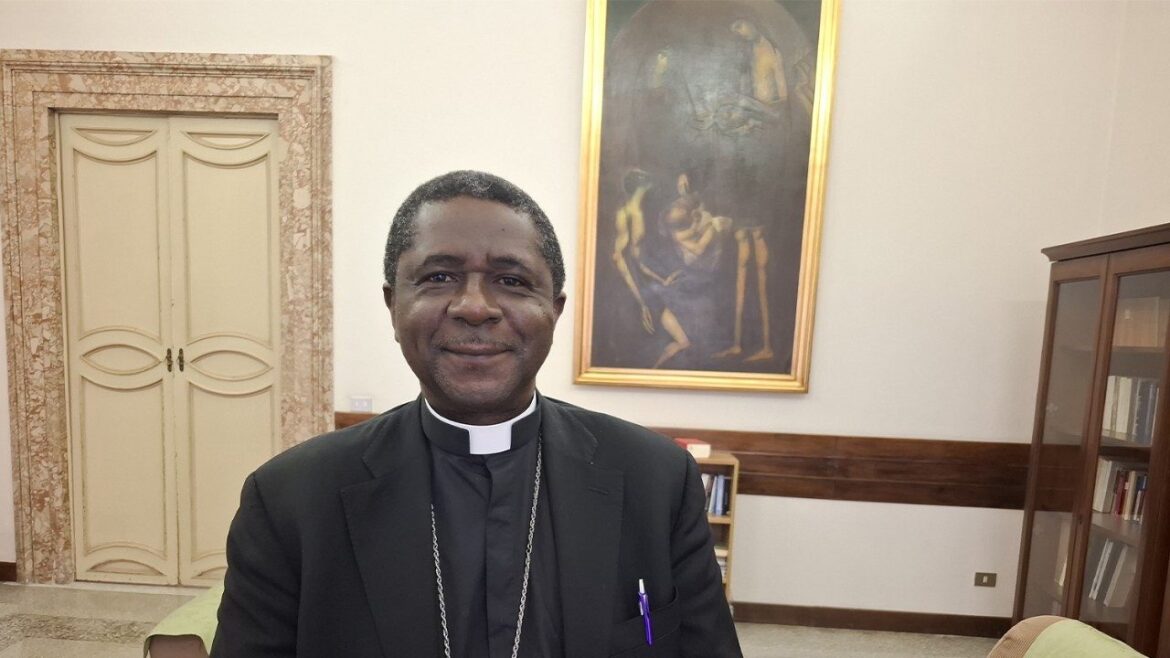This week, as the world shifted its gaze from post-electoral turmoil in Cameroon to Tanzania, the Archbishop of Bamenda and President of the National Episcopal Conference of Cameroon, Archbishop Andrew Nkea Fuanya, shares some of his thoughts with Vatican News on what could be the way forward for Cameroon. Archbishop Nkea was in Rome recently, leading over 100 “Pilgrims of Hope” visiting Rome and other holy sites for the 2025 Jubilee of Hope. The pilgrimage, which started on 24 October, conclude
Paul Samasumo – Vatican City.
On 27 October, after Cameroon’s presidential election, the country’s Constitutional Council declared the incumbent Presiendent Paul Biya as duly elected. At 92, President Paul Biya has begun his eighth term in office. He first became Cameroon’s second president in 1982.
As has happened in Tanzania recently, though with notable differences, Cameroon’s security forces cracked down on protests in support of the opposition candidate, Issa Tchiroma Bakary. On 4 November 2025, the news agency, Reuters, reported that Cameroon’s security forces killed 48 civilians as they responded to protests against the re-election of President Paul Biya. Protests have largely died down, but observers say a palpable climate of tension remains, especially in large cities. Vatican News spoke to Archbishop Nkea.
So, what next for Cameroon now that the election is over and some semblance of normality is returning to the nation’s cities -after post-election protests?
Cameroon is going through a difficult situation, as is the case in some African countries, where democracy is done in an African way. And unfortunately, this is resulting in the loss of lives. This is not what democracy is all about. I don’t want to go into the nitty-gritty of the election about who rigged and who did not rig, but the important thing is that nobody can live forever. And so, we cannot kill ourselves, destroy our own country, because elections have turned out one way or the other. We have a right to protest if we are not happy. It is the right of every country. It is the right of every human being to manifest their dissatisfaction.
My call to all Cameroonians is that they should hold their peace, hold their anger, and manifest in different ways, in legal ways. As Cameroonians, let us try to live in peace. I call for genuine dialogue between the government and the opposition. The government should be able to engage in dialogue with the opposition and determine, together, how they can bring peace to Cameroon. You cannot just focus on your power while people are dying. You cannot just focus on your power while people are losing all their property. The important thing for me is that the government should initiate a dialogue with the opposition.
Your Grace, another area that may still need dialogue is what is sometimes referred to as the “forgotten Anglophone Crisis.” This is about the violent conflict between Cameroon’s security forces and Separatist armed groups in the Anglophone regions. What is happening there?
The Anglophone Crisis has been going on for eight years. We are getting into the ninth year of that crisis. And not much is happening to resolve the root cause of the crisis. However, if you look at 2017, 2018, and 2019, and then come to 2025, you will discover that a lot has happened. A lot of calm has returned. But that doesn’t mean the crisis is over. There is still a lot of dissatisfaction among Anglophones. Here and there, you have pockets of Separatist fighters who are still making life very uncomfortable for the people. The whole area is militarised. And while the Separatists are committing their own crimes against the people, the Cameroonian soldiers, too, are not left out. They are committing their own crimes against the people. But I think that things have gotten far, far better. There is relative calm. And we are only praying that we should continue this period of dialogue to see how we can bring a definitive end to this, what we now call the Anglophone problem.
At one time, there was talk of almost a million forcibly displaced people in the Anglophone regions, including internally displaced persons (IDPs) and refugees -most of whom fled to Nigeria. Are they returning to their homes?
Yes, I think quite a handful have gone back. But I sometimes tell Separatist group leaders that one of the things they have succeeded in doing to Cameroon is to mix Cameroonians in a way that it will hardly ever divide. I travel a lot within the country, and if you go to Yokadouma, you see boys from the northwest selling in the market. You go to Sangmelima. You meet people from Lebialem in the southwest working on cocoa farms. You go to the far north in Yagoua. You see Bamenda women selling in the market and harvesting groundnuts. And you ask them, ‘Are you going back?’ They say, ‘For what?’ Go to Foumbot; practically everybody there now speaks English because of the Anglophones who have settled in the area. They have worked and bought farms. They have started businesses. And their businesses are flourishing. So, they are going back for what? These are some of the effects of this crisis. But I think those who didn’t integrate into the places they went, especially those who ran to Nigeria, many are coming back. And we can see that from the populations that are in the churches. The schools are now full again, especially in urban areas. The places where people don’t go easily are the peripheries because they are afraid of the Separatist fighters. But I think, so far, things are far better than they were at the beginning.


